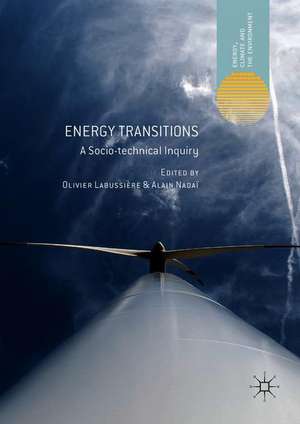Energy Transitions: A Socio-technical Inquiry: Energy, Climate and the Environment
Editat de Olivier Labussière, Alain Nadaïen Limba Engleză Hardback – 14 mai 2018
| Toate formatele și edițiile | Preț | Express |
|---|---|---|
| Paperback (1) | 890.85 lei 43-57 zile | |
| Springer International Publishing – 2 feb 2019 | 890.85 lei 43-57 zile | |
| Hardback (1) | 896.08 lei 43-57 zile | |
| Springer International Publishing – 14 mai 2018 | 896.08 lei 43-57 zile |
Din seria Energy, Climate and the Environment
- 9%
 Preț: 626.55 lei
Preț: 626.55 lei - 20%
 Preț: 629.40 lei
Preț: 629.40 lei - 8%
 Preț: 610.62 lei
Preț: 610.62 lei - 15%
 Preț: 636.63 lei
Preț: 636.63 lei - 18%
 Preț: 730.35 lei
Preț: 730.35 lei -
 Preț: 391.61 lei
Preț: 391.61 lei - 15%
 Preț: 651.51 lei
Preț: 651.51 lei - 15%
 Preț: 644.18 lei
Preț: 644.18 lei -
 Preț: 394.51 lei
Preț: 394.51 lei -
 Preț: 389.70 lei
Preț: 389.70 lei - 15%
 Preț: 644.18 lei
Preț: 644.18 lei - 15%
 Preț: 640.06 lei
Preț: 640.06 lei -
 Preț: 392.60 lei
Preț: 392.60 lei -
 Preț: 389.70 lei
Preț: 389.70 lei - 15%
 Preț: 642.51 lei
Preț: 642.51 lei -
 Preț: 387.75 lei
Preț: 387.75 lei - 15%
 Preț: 641.85 lei
Preț: 641.85 lei - 18%
 Preț: 993.43 lei
Preț: 993.43 lei -
 Preț: 389.70 lei
Preț: 389.70 lei - 15%
 Preț: 644.18 lei
Preț: 644.18 lei - 15%
 Preț: 640.06 lei
Preț: 640.06 lei - 15%
 Preț: 646.11 lei
Preț: 646.11 lei -
 Preț: 390.63 lei
Preț: 390.63 lei - 18%
 Preț: 951.29 lei
Preț: 951.29 lei - 15%
 Preț: 635.15 lei
Preț: 635.15 lei - 15%
 Preț: 641.03 lei
Preț: 641.03 lei - 15%
 Preț: 632.01 lei
Preț: 632.01 lei -
 Preț: 389.70 lei
Preț: 389.70 lei - 15%
 Preț: 641.71 lei
Preț: 641.71 lei -
 Preț: 386.22 lei
Preț: 386.22 lei - 15%
 Preț: 644.95 lei
Preț: 644.95 lei -
 Preț: 391.61 lei
Preț: 391.61 lei - 18%
 Preț: 729.06 lei
Preț: 729.06 lei - 15%
 Preț: 643.99 lei
Preț: 643.99 lei
Preț: 896.08 lei
Preț vechi: 1092.78 lei
-18% Nou
Puncte Express: 1344
Preț estimativ în valută:
171.49€ • 178.37$ • 141.57£
171.49€ • 178.37$ • 141.57£
Carte tipărită la comandă
Livrare economică 14-28 aprilie
Preluare comenzi: 021 569.72.76
Specificații
ISBN-13: 9783319770246
ISBN-10: 3319770241
Pagini: 206
Ilustrații: XIX, 348 p. 6 illus.
Dimensiuni: 148 x 210 x 31 mm
Greutate: 0.59 kg
Ediția:1st ed. 2018
Editura: Springer International Publishing
Colecția Palgrave Macmillan
Seria Energy, Climate and the Environment
Locul publicării:Cham, Switzerland
ISBN-10: 3319770241
Pagini: 206
Ilustrații: XIX, 348 p. 6 illus.
Dimensiuni: 148 x 210 x 31 mm
Greutate: 0.59 kg
Ediția:1st ed. 2018
Editura: Springer International Publishing
Colecția Palgrave Macmillan
Seria Energy, Climate and the Environment
Locul publicării:Cham, Switzerland
Cuprins
Introduction: From ‘The Energy Transition’ to ‘Energy transitions in-the-making’.- Chapter 1: Re-materializing energy transition processes.- Chapter 2: Economizing the Energy Transition.- Chapter 3: The Politics of Policy Instruments.- Chapter 4: The Technological Demonstration at the core of the Energy Transition.- Chapter 5: (Dis)placing or the spatialities the energy transition processes.- Chapter 6: (De)populating or the temporalities of energy transition processes.- Conclusion.
Notă biografică
Olivier Labussière is a researcher at the French National Scientific Research Centre (CNRS). He is member of the Pacte Research Centre (Grenoble, France) where he leads the interdisciplinary “Environments” research group. He studies the relationships between energy, society and space, and their emerging issues and politics in different environments (underground, onshore, offshore, aerial).
Nadaï Alain is senior interdisciplinary social scientist at CIRED, the International Research Centre on Environment and Development, a part of French CNRS. His research activity has been centred on environmental controversies and policies, landscape policies, energy transition policies and the societal and spatial changes induced by energy transition processes. He has contributed as a leading author to the IPCC Special Report on Renewable Energy Sources and Climate Change Mitigation (SRREN, 2011).
Textul de pe ultima copertă
This book elucidates what it means to transition to alternative sources of energy and discusses the potential for this energy transition to be a more democratic process. The book dynamically describes a recent sociotechnical study of a number of energy transitions occurring in several countries - France, Germany and Tunisia, and involving different energy technologies - including solar, on/off-shore wind, smart grids, biomass, low-energy buildings, and carbon capture and storage. Drawing on a pragmatist tradition of social inquiry, the authors examine the consequences of energy transition processes for the actors and entities that are affected by them, as well as the spaces for political participation they offer. This critical inquiry is organised according to foundational categories that have defined the energy transition - ‘renewable’ energy resources, markets, economic instruments, technological demonstration, spatiality (‘scale’) and temporality (‘horizon(s)’). Using a set ofselect case studies, this book systematically investigates the role these categories play in the current developments in energy transitions.
Caracteristici
Offers a social science perspective on contemporary energy transition processes Proposes a critical analysis of the key dimensions of energy transition processes 'in-the-making' Addresses the innovative and sometimes disruptive potential of these processes
